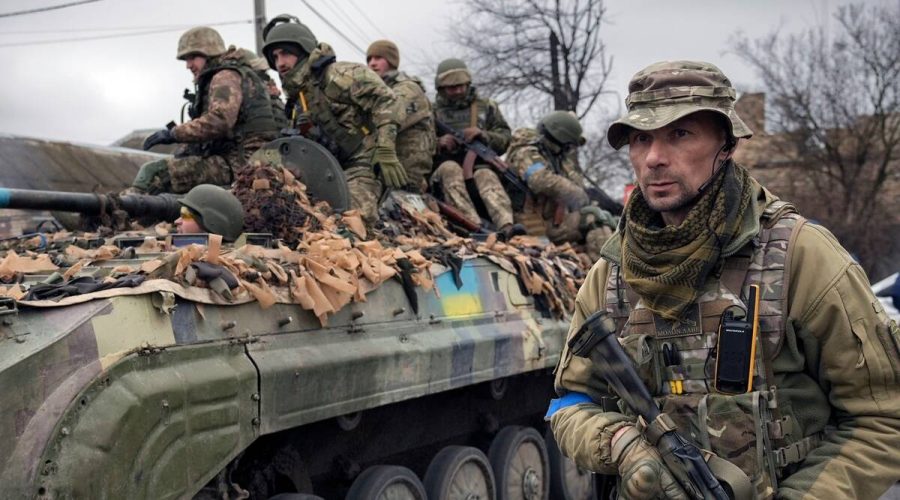How St. Luke’s is Talking About Ukraine – From a Student’s Perspective
A Ukrainian serviceman walks next to a fighting vehicle, outside Kyiv, Ukraine.
May 17, 2022
Since late February, Ukraine has been actively resisting Russian invasion. Observing this war from thousands of miles away feels surreal. As students in the United States, our everyday lives remain relatively the same, but in reality, our entire world is changing.
Over four million Ukrainian refugees no longer have homes, and thousands take shelter in train stations. While in America the impacts of the war are limited to rising gas prices and news coverage, the St. Luke’s staff have been making an effort to start conversations about Ukraine and keep students informed and aware. But we have to wonder, is it enough?
Different members of the St. Luke’s community have been making efforts to bring awareness to the situation in Ukraine through various means. These include sending out informative emails, hosting open discussions and fundraisers, and incorporating current headlines into classwork.
Sending out informative emails to the school community is an efficient way that allows for students to get the facts quickly. The only drawback is that emails are easily lost and ignored. While emails are a good way to get quick, reliable information, they only offer passive taking in of the material. Therefore, SLS has also had in-person opportunities for collaboration and discussion
On Friday, April 1st, an open forum on Ukraine was held. The discussion covered real-time facts about Ukraine, the background on Putin’s rise, the importance of Moscow to Putin, NATO’s participation and more. The discussion went far beyond simply answering questions. Cessa Lewis ‘23, a student who attended, said, “I went in not knowing much about the crisis and left with the history of Russia in my back pocket and pondering over the future of democracy in this new age.”
The history department is interested in helping people understand what’s happening from different perspectives, and students are able to ask their own questions and get reliable answers. Discussion participants included Head of School Mark Davis, Mr. Haynes and Ms. Abbot. Having the teachers that students know from class talk about the crisis makes the panel a more personal and comfortable experience. Cessa Lewis ‘23 said, “It was an awesome experience to see my teachers outside of the classroom speaking so passionately and knowledgeably about the crisis.”
St. Luke’s also hosted a discussion for students to talk with Colonel Robert Peters about Ukraine. Col. Peters, who served in the U.S. Office of Defense Cooperation Chief at the embassy in Kyiv, shared military insight, went over a brief history of Ukraine and opened up the floor to the students so they could ask questions. This was another interactive experience where the students were able to express their own concerns and questions.
The students of St. Lukes have been learning about the crisis in Ukraine and some have taken action. Two freshman students organized a fundraiser from March 7th through March 11th. The donations were sent to the Ukraine Crisis Relief Foundation by Global Giving. The donations provided Ukrainians with food, shelter, clean water, health and psychosocial support, and allowed access to education and economic support.
Finally, St. Luke’s has encouraged history teachers to discuss Ukraine in class. This allows for students to ask questions in a safe space, and for those who did not participate in any of the opportunities to learn more in depth about what is going on in Ukraine. Personally, I have found that implementing discussion about Ukraine into the classroom environment is the most ideal way to learn and discuss. My teacher has assigned work, started discussions and even sent emails with informational articles. These have all helped me understand what is going on on a deeper level.
It seems that as the situations develop so are the ways information is spread. When developments advance, questions arise, and teachers typically have more than one answer. Mr. Haynes, the Upper School history department chair, believes if history teachers don’t talk about current global events, then they are not doing service to the students or the curriculum.




Teddy • May 18, 2022 at 2:42 pm
Amazing article about a tough topic